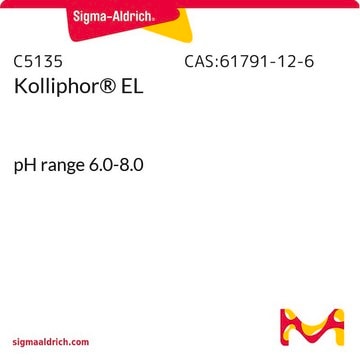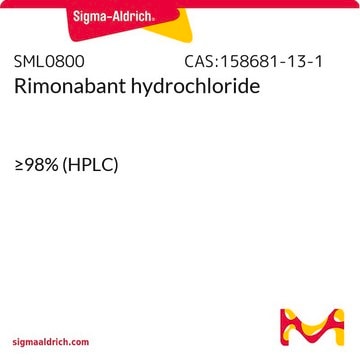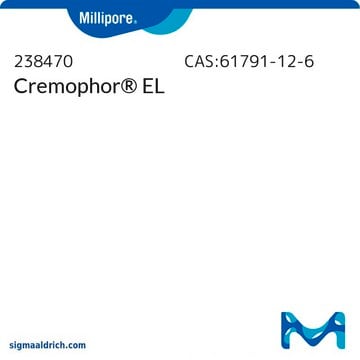A0580
Arachidonylethanolamide
≥97.0% (TLC), oil
Synonyme(s) :
Anandamide (20:4, n-6), AEA, Anandamide, Arachidonic acid N-(hydroxyethyl)amide
About This Item
Produits recommandés
Niveau de qualité
Pureté
≥97.0% (TLC)
Forme
oil
Contrôle du médicament
regulated under CDSA - not available from Sigma-Aldrich Canada
Couleur
colorless to light yellow
Solubilité
ethanol: soluble
Densité
0.92 g/mL at 25 °C (lit.)
Type de lipide
omega FAs
Conditions d'expédition
dry ice
Température de stockage
−20°C
Chaîne SMILES
O=C(CCC/C=C\C/C=C\C/C=C\C/C=C\CCCCC)NCCO
InChI
1S/C22H37NO2/c1-2-3-4-5-6-7-8-9-10-11-12-13-14-15-16-17-18-19-22(25)23-20-21-24/h6-7,9-10,12-13,15-16,24H,2-5,8,11,14,17-21H2,1H3,(H,23,25)/b7-6-,10-9-,13-12-,16-15-
Clé InChI
LGEQQWMQCRIYKG-DOFZRALJSA-N
Informations sur le gène
rat ... Cnr1(25248)
Vous recherchez des produits similaires ? Visite Guide de comparaison des produits
Application
- Interactions Between Endocannabinoid and Endogenous Opioid Systems Prospectively Influence Postoperative Opioid Use in Pregnant Patients Undergoing Cesarean Delivery: Investigates Arachidonylethanolamide′s interactions with opioid systems, providing insights that could lead to better management of postoperative pain and opioid use (Stone et al., 2024).
Actions biochimiques/physiologiques
Attention
Code de la classe de stockage
11 - Combustible Solids
Classe de danger pour l'eau (WGK)
WGK 3
Point d'éclair (°F)
Not applicable
Point d'éclair (°C)
Not applicable
Équipement de protection individuelle
Eyeshields, Gloves, type N95 (US)
Certificats d'analyse (COA)
Recherchez un Certificats d'analyse (COA) en saisissant le numéro de lot du produit. Les numéros de lot figurent sur l'étiquette du produit après les mots "Lot" ou "Batch".
Déjà en possession de ce produit ?
Retrouvez la documentation relative aux produits que vous avez récemment achetés dans la Bibliothèque de documents.
Les clients ont également consulté
Notre équipe de scientifiques dispose d'une expérience dans tous les secteurs de la recherche, notamment en sciences de la vie, science des matériaux, synthèse chimique, chromatographie, analyse et dans de nombreux autres domaines..
Contacter notre Service technique










